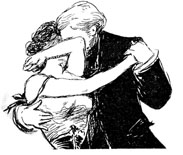
Lust
HARVARD DIARY
In our time lust is far from a secret or hidden part of ourselves; rather, it is an everyday and evident companion, ever ready to connect with us — urged on us in advertisements, on talk shows, in the movies and on television: sexuality and sensuality and desire — the last for sex, of course, but also for all that has been sexualized, and that is a whole lot (our clothes, our cars, our food, for starters). But by lust I mean, here, no ordinary impulse or wish, no commonplace fantasy or daydream that has to do with a person, usually, or a place or a thing. The issue is intensity, fixity — how much of one’s life is given over to a particular concern. These days, the word “obsessional” gets used — a constancy, a tenacity of thought, of passion, to the point that the rest of our thinking life, and maybe our doing life, gets diminished.
Sin, in general, has to do with violation — a transgression that puts one at a remove, morally and spiritually, from God, as He is revealed to us, step by step, in the Bible, and afterwards through the religious life that has been an important part of our churchgoing history. It is not easy, in these last years of the 20th century, to talk about sin with the college students I teach, or with many doctors, psychiatrists. If I talk about sex, about obsessions, I am heard. If I talk, even, about the violation that an obsession can cause in someone, I’ll also be heard, though such violation is not the kind I just mentioned a few sentences back — rather, the reference has to do with “impaired psychological function,” with “diminished psychic energy” for other aspects of a life so heavily burdened by one or another fixation or fetish or, to use today’s pleasant vernacular, hang-up. Yet in our own secular manner, sometimes awkwardly and ponderously, courtesy of the technical language of psychology and psychiatry, sometimes more vividly, arrestingly, as in “hang-up,” we seem to know what the saints, the church Fathers, the theologians, the ordinary people of faith have known all along, that the assertion of any appetite is not be confused with the domination of a life by that same appetite. In our own way, too, we make our judgments — though of course (and alas) without resort to any divine order, any mention of God, of sin. We summon the language of the social sciences, usually, words far from objective or merely descriptive; rather, we make normative use of phrases, such as “primitive defenses,” “acting out,” or “borderline behavior,” “impulsive character structure,” “dysfunctional” — a manner of condemnation, or maybe a way for us to express our moral alarm, our very human worry and misgivings, without of course venturing into religious territory.
You May Also Enjoy
The opening struggle for a New Jerusalem is naturally beyond anyone’s ken. A novelist, perhaps alone among us, has the capacity to make compelling guesses.
For two years I taught a fourth-grade class in a school just a few blocks…
I first met Christopher Lasch in the middle 1960s. My wife, Jane, and I had…

